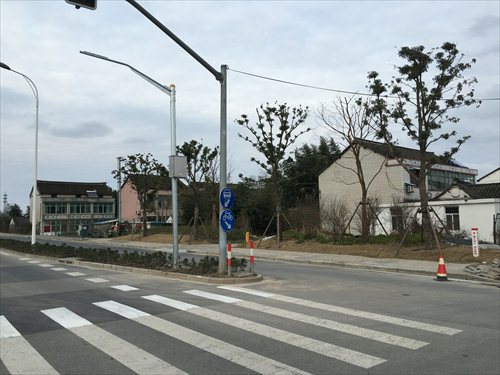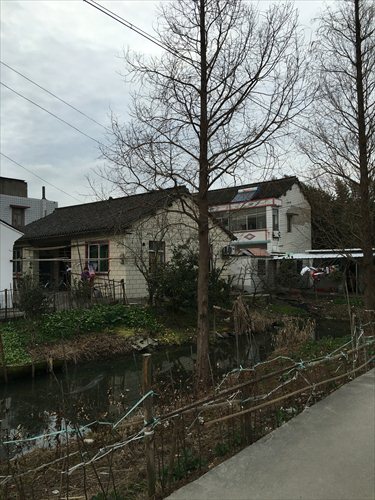HOME >> METRO SHANGHAI
Lack of regulations delays Disney Resort family accommodation project
By Yang Lan Source:Global Times Published: 2016-3-9 17:23:01

A scale model of the Shanghai Disney Resort Photo: IC
Last September, the first bed and breakfast (B&B) project in the area around the Shanghai Disney Resort was launched at Chenqiao village, Chuansha township in Pudong New Area. The project plans to have more than 100 B&B establishments when the Disney Resort officially opens on June 16. The project aims to offer star-hotel quality service and local cultural experiences to tourists who are visiting the Disney Resort.
However more than five months have passed and work on the B&B project has not yet begun. Because of a lack of building codes and standards, most of the residential buildings rented for the development of B&Bs have not started renovations. Some newly built B&Bs can't begin operating without proper licenses. In Pudong New Area's Two Sessions (the Pudong New Area People's Congress and the Pudong New Area People's Political Consultative Conference), some government departments proposed that the regulations should be released as soon as possible so that these B&Bs could open for business. But no one could give an actual timetable.

Homes near the Shanghai Disney Resort Photo: Global Times
Reluctant to rent
Some companies are building houses for the B&B project and others plan to rent homes from local villagers and renovate them into B&Bs. Chenqiao village is only a kilometer from the Disney Resort. The village has about 3,000 residents, but there are a limited number of vacant houses and some residents are reluctant to rent their homes to strangers.
Liu Wen (pseudonym) has been approached about renting out her house as a B&B establishment but she is hesitant.
"Agents from the B&B project have visited us several times. Our house matches their requirements, but I am still considering whether I want to sign the contract," Liu said. She is discussing it with her husband - renting out the house could increase their income. The problem is that Liu, her husband and their child live there and if they rent their home out they will have to find another place to live.
Other villagers know that B&B establishments are a new thing in China, and there are no official building codes, standards or regulations for this project so far. They will move but only after the government releases the official regulations.
Some villagers have already signed contracts with the B&B project and moved out of their houses. Mr Zhou is one of them. Zhou moved out from his two-story home, and signed a 10-year contract with a B&B development company. The house is less than 150 square meters but Zhou receives 2,000 yuan ($307) in rent every month. There will be a bonus when the B&B business is up and running.
"Over the 10 years the rent and the bonuses will rise every few years," Zhou said. Construction workers have shown him the renovation plans and their work schedule. Zhou thinks they will begin work soon and the renovations will be completed by June 15.
Once the B&B business starts, the tourism companies will run the business but, if he decides to undergo training, he might be able to offer services like cooking.
Covered in dust
Ms Chen also signed a contract and rented out two of her houses for the B&B project. But she hasn't heard anything further after handing the houses over. The properties are covered in dust.
Wang Kai is a manager with one of the B&B development companies and when asked about the renovations he said the B&Bs would have to "wait a bit longer."
Wang's company has signed contracts with about 100 villagers, and some of them have already moved out. However, Wang knows that there are no policies or regulations on how these houses need to be fitted and which licenses will be needed for B&Bs. "We do not know how we can use these vacant houses yet," Wang admitted.
And some of the newly built B&Bs are still vacant. Zhang Yixin, a spokesperson for a tourist agency in Shanghai, said that they built a 21-room B&B last October. However, because there are no current regulations for B&Bs in Shanghai, fire safety certificates and other licenses cannot be issued.
"Our B&B was built according to hotel standards. The materials are fireproof and smoke detectors and fire extinguishers are installed in every room. The building has only one floor and it's next to the lake. We never need to worry about a water supply if there's a fire," Zhang said.
Not proceeding
According to Wang, there are about 12,000 hotel rooms in the five-square-kilometer area of the Disney Resort. But B&Bs, as a new type of accommodation, lack regulatory support. Without knowing which kind of houses can be developed as B&Bs and what the regulations are for these establishments, the B&B project cannot proceed any further.
"We are patiently waiting for the B&B regulations to be released. But, at the same time, we are trying to build the business team for the B&Bs," Wang said. The developers are willing to allow the government and the market more time, so that B&B businesses can have standardized services and a properly-regulated market.
There are already some B&B projects in Fujian and Zhejiang provinces, but there are no regulations covering their operation.
An official from the Commission of Commerce in Pudong New Area said policies and standards for B&Bs were being drafted currently but it was not known when they would be released. Once the measures are released, they will focus on fire safety, management and coordination for B&Bs. The Chuansha and Zhoupu townships in Pudong New Area will be the first trial areas for the B&B projects.
Ten Shanghai government departments, including the Public Security Bureau and the Shanghai Municipal Tourism Administration, have launched a research project on B&Bs in Shanghai. Professor Feng Xuegang from the Faculty of Economics and Management at East China Normal University is on the research team.

Homes near the Shanghai Disney Resort Photo: Global Times
Natural advantages
"Currently, B&Bs in Shanghai do not have the natural advantages that Zhejiang B&Bs have. Many of the places in Zhejiang Province are surrounded by mountains and rivers, but in Shanghai there is mainly flat land. And the houses in many of the river towns in Zhejiang Province are very well preserved. There is limited land area in Shanghai and we can only use vacant houses from local people," Feng said.
He believes that, as well as accommodation, B&Bs should also provide cultural experiences and activities. Related facilities including tourist centers, parking lots and washrooms should also be built to proper standards.
"There are also issues regarding security, fire safety, food, entertainment, hygiene and tax registration. Local homes can't be assessed at the same standards for hotels because the structural quality is different. We have proposed that before turning residential buildings into B&Bs, we invite government housing inspectors to assess the buildings. Their evaluation should be one of the things we take into consideration when deciding if a house can be used as a B&B or not."
Feng also thinks that there could be problems with the electrical wiring in homes that have been converted to B&Bs.
Complied by Yang Lan based on reports in the Oriental Morning Post and eastday.com
Newspaper headline: The bed and breakfast breakdown
Posted in: Metro Shanghai, City Panorama